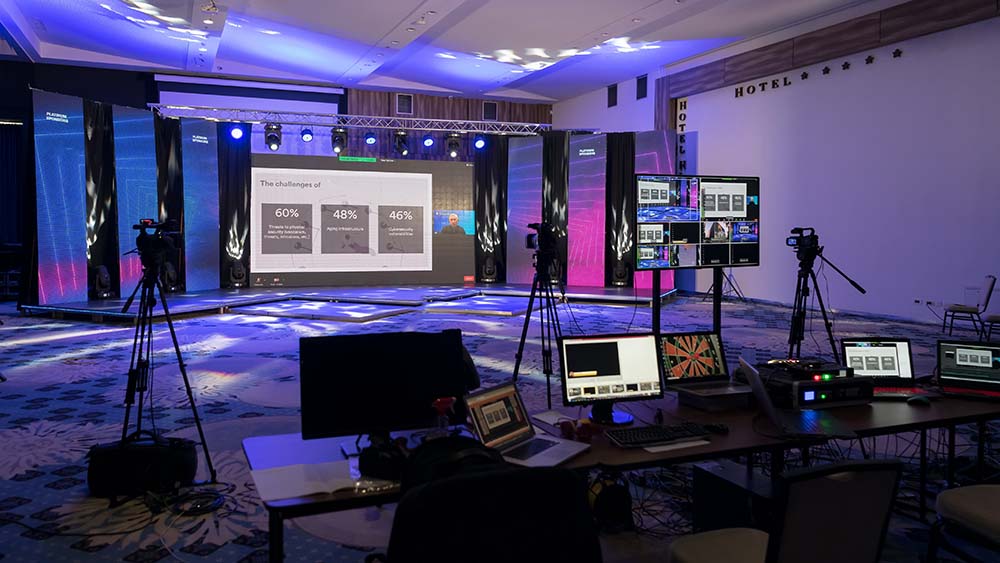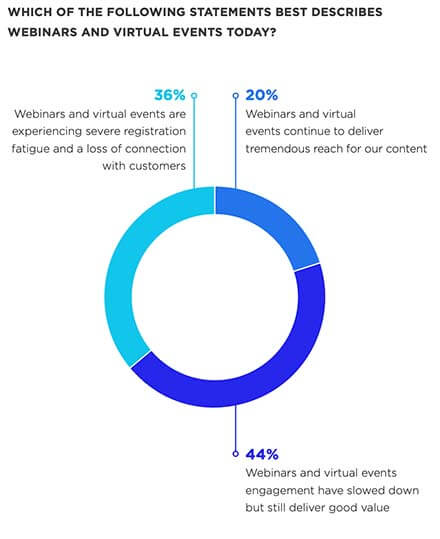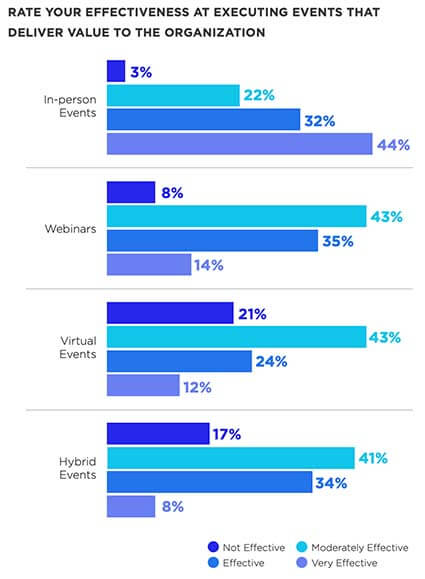
More than seven out of 10 marketers in a recent study said they are experimenting with new event formats, like smaller, more specialized in-person events infused with digital components.
This year will be marked by learning through trial and error, the speakers told the audience at a breakout session at the JW Marriott in Nashville at CEMA Summit ‘22, held July 31–Aug. 2. After all the upheaval brought on by the pandemic and with in-person events on the rebound yet not the same as pre-pandemic, the speakers — Pauline Giust, senior manager of meetings and events at Cvent, and Alyssa Peltier, senior manager of the product marketing industry solutions group at Cvent Consulting — didn’t need to convince the corporate event marketing professionals in the room of that reality.
But their session, “Research Exposed: CMO Council Explores the Future of the Event Industry,” had data to support their statement about 2022 being the year of experimentation. Here’s a closer look at CMO Council’s study, “NextGen Events: Optimized for Outcomes,” produced in collaboration with Cvent and based on a survey of 150 global marketing leaders and in-depth interviews with executives from Equifax, GE Healthcare, HCL Software, and GfK:
 Formats and types of events are under greater consideration. The CMO Council defines “NextGen” events as spanning different formats (virtual/webinar, in-person, and hybrids), as well as types (e.g., conferences, trade shows, road shows, customer groups). NextGen events are tied to business outcomes among customers: brand awareness, lead generation, retention, and loyalty. “The sudden cancellation of in-person events and a massive swing to virtual ones left event planners scrambling,” the report says. “Now is the time to regain your footing.”
Formats and types of events are under greater consideration. The CMO Council defines “NextGen” events as spanning different formats (virtual/webinar, in-person, and hybrids), as well as types (e.g., conferences, trade shows, road shows, customer groups). NextGen events are tied to business outcomes among customers: brand awareness, lead generation, retention, and loyalty. “The sudden cancellation of in-person events and a massive swing to virtual ones left event planners scrambling,” the report says. “Now is the time to regain your footing.”
Marketers haven’t yet mastered virtual. Sixty-four percent of marketing leaders say they’re only moderately or not at all effective at executing virtual events that deliver value to the organization.
Each channel should be used to deliver on different objectives. While three out of five marketing leaders say restarting in-person/hybrid events is very important, one out of five say virtual events continue to deliver tremendous reach. Virtual events are more about brand reach; in-person events are about nurturing customer relationships that result in higher conversion rates.
“There was a kind of reset button.” Sixty-five percent say their learnings over the past two years will result in a holistic view of events — virtual, in-person, and hybrid — that are better aligned with marketing outcomes. In addition, due in part to workforces moving to a virtual environment and collaborating more with different teams, 45 percent said that cross-departmental teams will be better aligned. “Because we’re all virtual now, communication has gotten so much better,” Sonia Sahney, CMO of MI and CT at GE Healthcare, said in the report. “I can let global colleagues, different businesses, and regional teams know I’m doing an event on a specific date and see if anyone else is doing something similar. There was a kind of reset button, in terms of how much more we share.”
 Why is hybrid so hard? Only around one-third of marketers rate their ability to execute hybrid events as effective or very effective — the worst effectiveness rating among the four major event types (in-person, webinars, virtual, hybrid). “A hybrid event is double the cost, double the resources, because you’re essentially doing what you did in 2019 and adding a virtual presence like you did in 2020,” Sahney said. “At least in my marketing budget for next year, I’ve allocated close to 1.8x for hybrid events.”
Why is hybrid so hard? Only around one-third of marketers rate their ability to execute hybrid events as effective or very effective — the worst effectiveness rating among the four major event types (in-person, webinars, virtual, hybrid). “A hybrid event is double the cost, double the resources, because you’re essentially doing what you did in 2019 and adding a virtual presence like you did in 2020,” Sahney said. “At least in my marketing budget for next year, I’ve allocated close to 1.8x for hybrid events.”
Aside from the costs, there’s the risk of virtual registration cannibalizing in-person registration. Said GfK Global CMO Gonzalo Garcia Villanueva: “You know who you want in person so you invite them only to the live event. You know who’s probably not going to travel so you invite them to the digital one. For those who haven’t engaged with your communications, you offer digital at the last minute. That was a massive learning.”
How will in-person/hybrid events compare with pre-pandemic in-person events? Three out of five said they will be smaller in size. On the upside, 47 percent said they will have deeper engagement; two out of five said they will have better content, packaging, and delivery and offer richer attendee profiling and ROI measurement; nearly one-third expect them to be held more frequently; one-quarter expect them to result in increased reach and awareness; more than one out of five anticipate higher customer conversion rates; and 13 percent believe they will provide greater visibility for sponsors.
Greater experimentation. More than seven out of 10 marketers said they are experimenting with new event formats — for example, smaller, more specialized in-person events that are infused with digital components.
Get Your Copy
Download the CMO Council study “NextGen Events: Optimized for Outcomes.”
RELATED: Choosing an Event Model: No Straightforward Approach
Michelle Russell is editor in chief of Convene.
